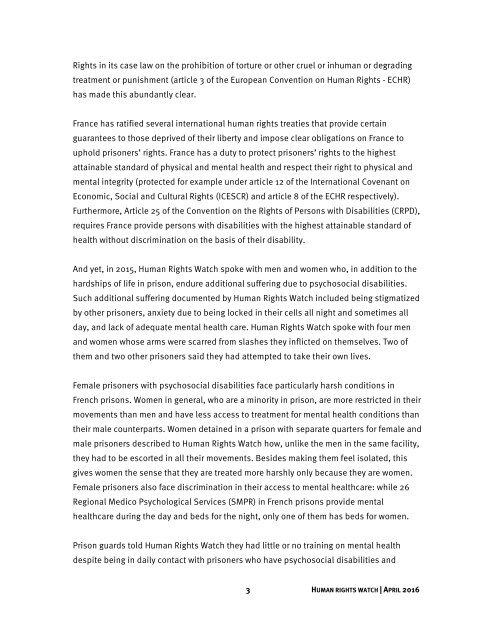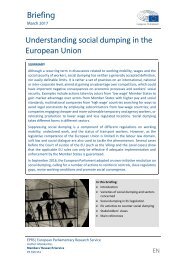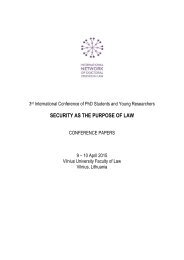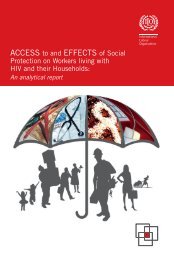DOUBLE PUNISHMENT
france0416web
france0416web
You also want an ePaper? Increase the reach of your titles
YUMPU automatically turns print PDFs into web optimized ePapers that Google loves.
Rights in its case law on the prohibition of torture or other cruel or inhuman or degrading<br />
treatment or punishment (article 3 of the European Convention on Human Rights - ECHR)<br />
has made this abundantly clear.<br />
France has ratified several international human rights treaties that provide certain<br />
guarantees to those deprived of their liberty and impose clear obligations on France to<br />
uphold prisoners’ rights. France has a duty to protect prisoners’ rights to the highest<br />
attainable standard of physical and mental health and respect their right to physical and<br />
mental integrity (protected for example under article 12 of the International Covenant on<br />
Economic, Social and Cultural Rights (ICESCR) and article 8 of the ECHR respectively).<br />
Furthermore, Article 25 of the Convention on the Rights of Persons with Disabilities (CRPD),<br />
requires France provide persons with disabilities with the highest attainable standard of<br />
health without discrimination on the basis of their disability.<br />
And yet, in 2015, Human Rights Watch spoke with men and women who, in addition to the<br />
hardships of life in prison, endure additional suffering due to psychosocial disabilities.<br />
Such additional suffering documented by Human Rights Watch included being stigmatized<br />
by other prisoners, anxiety due to being locked in their cells all night and sometimes all<br />
day, and lack of adequate mental health care. Human Rights Watch spoke with four men<br />
and women whose arms were scarred from slashes they inflicted on themselves. Two of<br />
them and two other prisoners said they had attempted to take their own lives.<br />
Female prisoners with psychosocial disabilities face particularly harsh conditions in<br />
French prisons. Women in general, who are a minority in prison, are more restricted in their<br />
movements than men and have less access to treatment for mental health conditions than<br />
their male counterparts. Women detained in a prison with separate quarters for female and<br />
male prisoners described to Human Rights Watch how, unlike the men in the same facility,<br />
they had to be escorted in all their movements. Besides making them feel isolated, this<br />
gives women the sense that they are treated more harshly only because they are women.<br />
Female prisoners also face discrimination in their access to mental healthcare: while 26<br />
Regional Medico Psychological Services (SMPR) in French prisons provide mental<br />
healthcare during the day and beds for the night, only one of them has beds for women.<br />
Prison guards told Human Rights Watch they had little or no training on mental health<br />
despite being in daily contact with prisoners who have psychosocial disabilities and<br />
3 HUMAN RIGHTS WATCH | APRIL 2016











